Disabled fans left crying due to poor accessibility at live shows
Faith Martin is music journalist who has written for several publications, and has an Instagram campaign (@committoaccess) for venues to make live music accessible to disabled people.
Live music is a big part of what I do but hundreds of venues are still inaccessible to disabled fans. Covid has uncovered many obstacles that people with disabilities face in everyday life whether it’s being unable to leave the house or relying on food delivery slots for our everyday essentials, so when the worlds first socially distanced gig hit Newcastle the new setup struck a chord with many disabled fans regarding accessibility at concerts.
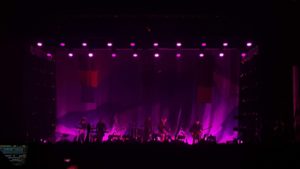
For me, there’s no better buzz than seeing your favourite artist walk on stage to a crowd of thousands but every year hundreds of fans are denied the chance due to poor accessibility and planning from venues and ticket vendors up and down the country. Just recently Newcastle’s golden boy Sam Fender took on the world’s first socially distanced gig that saw fans split into groups on various platforms throughout Gosforth Park and while some fans were less than impressed with the new arrangements what people have failed to realise is, disabled people can only attend concerts and festivals if there is one of those very platforms available, the idea that able-bodied people are complaining about this structure isn’t only ableist, it screams privilege.
Before disabled fans can even worry about access getting the tickets themselves is hard enough, many of the country’s leading ticket vendors such as Ticketmaster or SeeTickets don’t offer the option to buy accessible seating tickets on their website, instead disabled fans have to ring the venue’s box office directly which isn’t just a hassle it can cause many problems and result in fans not getting tickets at all. Just recently I tried booking tickets for a tour next year but due to covid the accessible ticketing line was closed and with no option for me to book online I was left disappointed as I watched the venue sell out without even being given a fair chance.
So what happens if you’re a disabled fan and have been lucky enough to secure those gig tickets you’ve been waiting for? Generally, if you’ve brought disabled tickets you’ll be shown to a wheelchair accessible seating area which is usually miles back from the stage on a small platform or on an upstairs balcony meaning that whilst you have a seat, fans with disabilities more often than no don’t get a choice in where they sit therefore getting anywhere near the stage is near on impossible meaning that a lot of the time we just don’t get the same experience or to feel part of the crowd which for many is a big part of live music events.
However, it turns out that being able to buy accessible tickets doesn’t necessarily mean the venue itself is disabled friendly as disability and lifestyle blogger Sarah Alexander told me her story of how the access was so poor she was unable to make it through the whole show:
“One gig I went to they said they had wheelchair spaces by the stage but when I got there they didn’t have any and told me there was a sofa upstairs in the bar that I could sit and see but no lift to get up to the bar. I left early and didn’t see the band I went to the gig for.” Sarah also said on another occasion she was left crying due to pain and ultimately left early once again.
“I went to on crutches, the venue was upstairs, got there and the lift was broken so struggled up the stairs and was crying by the time I got to the top. They then they offered me a really high stool at the back of the venue, I couldn’t see the bands, and people kept walking into the back of me and I ended up falling off the stool”.
Unfortunately, stories like this are all too common as one twitter user told me that they had to climb a flight of stairs despite explicitly telling the venue they were unable to do this and whilst they managed on the night this could have resulted in serious injury. What’s also clear is venues don’t just need to consider mobility access as many deaf and hard of hearing music fans are also left without hearing loops whilst fans who are registered blind or partially sighted rarely have access to vision aids at venues meaning they’re alienated from live music altogether.
Believe it or not, fixing these problems is a relatively simple task. With a little forward-thinking and listening to the needs of others, there’s no reason for venues to be inaccessible especially if the very same venue can put covid measures in place for people to return.
Faith Martin
September 2020
Listen to others, but be your own guide
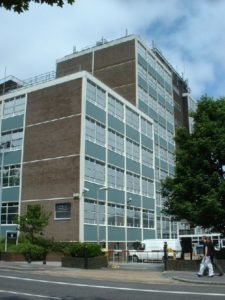
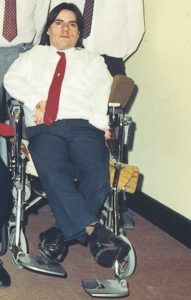
May 2020
Rob Trent blogs about the current Corona virus pandemic, and wonders what employment prospects for disabled people will look like when we get through this.
There aren’t many plus points to this Corona virus, if any. But one thing I’ve noticed recently is a spate of comments relating to disabled people and how employment opportunities could open up post-Pandemic.
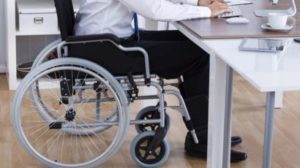
As businesses have looked to change the way they work, many have adopted new technology. Video conferencing, through Zoom or Teams has become the ‘new’, ‘smarter’ way of working. People no longer need to meet face-to-face, or sit in the same building, to do their job.
Suddenly, there’s a view, a lightbulb moment, that this could be a great thing for disabled people and that it will open up a whole new world of career opportunities.
And there is a great deal of truth in that. People who find travel difficult, and who have so much untapped talent, would be able to work from home and at the same time have the things around them that they need to get through a day. There is no downside surely?
As a disabled person, I feel this theory needs to treated with caution. And these are some reasons why I believe this move might not necessarily be the ‘new dawn’ for disabled people:
The technology has been around for a while;
Although businesses have rushed to embrace this technology as a way of maintaining continuity during the crisis, there are plenty of tales of disabled people who have previously requested working from home as a ‘reasonable adjustment’ but have been turned down. How annoying then to see it now being touted as the future.
Will it be the ‘cheap’ option?
I’m sure that technology like this will open up a different future, but I’m equally certain that it won’t be the only future. Over time, people will return to offices. Expecting disabled people to work from home should not be seen to necessarily be the best option just because it’s the most cost-effective.
Not all disabled people want to work from home.
When I started working, such technology didn’t exist. Even if it had been there, I most definitely would nothave wanted to work from home. To me, and I’m sure many other disabled people, getting to work, meeting people, being part of the team is just as much a part of work as doing the actual job. The social aspect to work is huge and shouldn’t be underestimated.
Are we actually going backwards?
I’m led to believe there was a similar watershed moment in 2012, following the Oylmpic games. But in reality disabled people have, if anything, seen the value of their lives lessened. Hostile environments, including the transfer from DLA to PIP and Universal Credit, are just some of the factors which have made us feel less valued.
And now we’re already reading that disabled people are not going to get assistance when travelling on public transport. Transport For London are reportedly suspending their Freedom Travel pass at peak hours. Its almost as if we’re not expected to work!
I’m an optimist. I like to believe that life for disabled people will change for the better when we get through all of this. The immediate signs aren’t promising.
And if technology is a solution that will be part of that improvement, giving more disabled people the chance to forge a career, fantastic. But lets be careful not to make it the only one.

Rob Trent
Listed buildings – The old excuse
This blog, by Ben Smith, is a good example of how some businesses are still using the ‘listed building’ tag as an excuse to avoid simple adaptations which would mean that disabled people can enjoy “lively concerts”. When places like the House of Commons can make changes then surely others can. AccessAdvisr calls on the Pavilion Bournemouth to work with disabled people and implement a practical solution.
Going to a concert should be a simple and enjoyable event. Venues have made accessibility a part of their offering, but it’s not always the case. The Pavilion in Bournemouth proving it hasn’t quite made the changes seen in some venues.
First of all, my excuses. This was a gig for OMD which is about as middle of the road and ‘safe’ as you can expect for me. I grew up on somewhat more 'alternative' music – this was a very sensible gig for me, so don’t shoot me down. As a very young boy, OMD was the very first album I bought. Across my very broad spectrum of musical tastes they still just fit in. I’m used to gigs where large parts of the crowd are dancing, jumping, and the rest. But I’ve always been able to see and experience the event now that I use a wheelchair. So OMD really shouldn't be the band to cause a problem.
I’ve been to the Pavilion for events before, but these have all been comedy. This was the first music event. It’s not really a surprise that at a music event everyone stands up. I don’t think I’ve ever been to a gig where everyone doesn’t stand, so stupidly I assumed they could handle the rock n roll antics of an 80s electro group… To say the placement of the wheelchair spaces at the back of a block of seats is a bad idea is an understatement. No raised area, just placed behind row F. All of the seats are fixed seats, so without any raised area, or thought to place accessible viewing at the front of seating you can guess what happened. As soon as they kicked off, I got a lovely view of the backsides of everyone in the row in front jiggling around. We moved to the end of the row, but the aisle was blocked by people dancing. Fortunately two people in front of us realised and moved so I could see something (much respect - pic attached when we got a gap to see through). Occasionally I saw some of the light show and a head or two, but mainly the evening was watching people’s backsides, and it’s interesting how the sound becomes muffled when you are basically tucked down below everyone else.
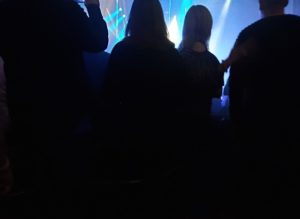
During this, no staff were available or visible. No staff came to check the accessible area when aisles were blocked. The venue failed to react. I was blocked in to the side, and behind. I’m sure I could have got out if had to via shoving and running over some feet, but there was no way out or staff visible.
I am going to make a guess that anyone who goes to a venue with any range of accessibility needs has been let down at some point. This for me, was probably not the worst experience I have had when going out, as some sports venues, restaurants are far worse - but did make me wonder – are some big venues just giving up on accessibility? The Pavilion in Bournemouth seems to have gone through a tick box exercise which is probably fine for any standard event (to a limit), but totally inadequate for any music event. Rather than just jumping on social media, I emailed after the event. The reaction was something to behold.
According to the venue the issue is the fault of the band for encouraging the audience to stand. "Artists will inevitably encourage the audience to stand up and dance in an attempt to create a good atmosphere in the Auditorium." Not the fact the venue hasn’t adequate accessible viewing areas or staffing, nor have they warned guests with accessibility requirements of the poor facilities for a music event. It is of course an old listed building, it is not easy, but there are many options that could be looked into. Unfortunately, well over 1 month after the original complaint went in, the venue has failed to follow up after I asked to escalate to the General Manager, which probably underlines the lack of commitment to accessibility.
After almost 10 years of cutbacks, venues know they aren’t being policed on these issues rigidly. Are they just going through the motions? There are some excellent venues out there, but the poor venues can get away with it.
The facilities, communication and response from this venue has been poor in my opinion. I’m sure it isn’t an isolated incident, and maybe this will help The Pavilion kick into action. Anyway. I would like to commend other venues out there. Maybe using old theatres for music events requires much more thought when it comes to accessibility - but other venues can do it. At the least, talk, otherwise the best view we’ll get is from the end of the row - if we’re lucky.
Ben Smith
